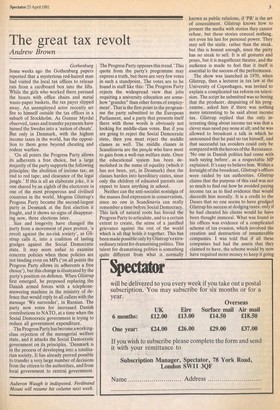The great tax revolt
Andrew Brown
Gothenburg Some weeks ago the Gothenburg papers reported that a mysterious red-haired man had visited the local tax offices to release rats from a cardboard box into the lifts. While the girls who worked there pursued the beasts with office chairs and metal waste-paper baskets, the tax payer slipped away. An unemployed actor recently set fire to himself outside the tax offices in a suburb of Stockholm. As Gunnar Myrdal observed, taxes and transfer payments have turned the Swedes into a 'nation of cheats'. But only in Denmark, with the highest income taxes in the world, has the opposition to them gone beyond cheating and rodent warfare.
'On all points the Progress Party allows its adherents a free choice, but a large majority of the party sUpports the following principles: the abolition of income tax; an end to red tape; and clearance of the legal jungle.' If this is all an elaborate joke, it is one shared by an eighth of the electorate in one of the most prosperous and civilised countries in the world. Mogens Glistrup's Progress Party became the second-largest party in Denmark at the first election it fought, and it shows no signs of disappearing now, three elections later.
Size and longevity have changed the party from a movement of pure protest, 'a revolt against the no-risk society', as Glistrup calls it, into a coalition of lasting grudges against the Social Democratic state. It may seem unfair to examine concrete policies when these policies are not binding even on MPS Con all points the Progress Party allows its adherents a free choice'), but this change is illustrated by the party's position on defence. When Glistrup first emerged, he proposed replacing the Danish armed forces with a telephoneanswering machine in the ministry of defence that would reply to all callers with the message 'We surrender', in Russian. The party now votes for increased Danish contributions to NATO, at a time when the Social Democratic government is trying to reduce all government expenditure.
The Progress Party has become a workingclass rejection of the managerial welfare state, and it attacks the Social Democratic government on its principles. 'Denmark is in the process of developing into a totalitarian society. It has already proved possible to transfer a very large number of decisions from the citizen to the authorities, and from local government to central government. The Progress Party opposes this trend.' This quote from the party's programme may express a truth, but there are very few votes in such a standpoint. The votes are to be found in stuff like this: 'The Progress Party rejects the widespread view that jobs requiring a university education are somehow "grander" than other forms of employment'. That is the first point in the programme the party submitted to the European Parliament, and a party that presents itself there with those words is obviously not looking for middle-class votes. But if you are going to reject the Social Democratic state, then you must reject the middle classes as well. The middle classes in Scandinavia are the people who have most to gain from a well-run welfare state. Once the educational system has been demolished in the name of equality (which it has not been, yet, in Denmark) then the classes harden into hereditary castes, since only the children of educated parents can expect to learn anything in school.
Neither can the anti-socialist nostalgia of the masses find expression in conservatism, since no one in Scandinavia can really remember a time before Social Democracy. This lack of natural roots has forced the Progress Party to articulate, and to a certain extent to create, the sense of a justified grievance against the rest of the world which is all tha,t holds it together. This has been made possible only by Glistrup's extraordinary talent for dramatising politics. This talent for dramatising politics is something quite different from what is normally known as public relations, if 'PR' is the art of concealment. Glistrup knows how to present the media with stories they cannot refuse, but these stories conceal nothing, not even his lust for personal power. They may sell the sizzle, rather than the steak, but this is honest enough, since the party has no steak to sell. It is all gestures and poses, but it is magnificent theatre, and the audience is made to feel that it itself is essential to the success of the performance.
The show was launched in 1970, when Glistrup, then a lecturer in tax law at the University of Copenhagen, was invited to explain a complicated tax reform on television. The script he submitted was so boring that the producer, despairing of his programme, asked him if there was nothing more interesting to be said about income tax. Glistrup replied that the only interesting thing about income tax was that a clever man need pay none at all; and he was allowed to broadcast a talk in which he announced that he paid no tax himself, and that successful tax avoiders could only be compared with the heroes of the Resistance. 'No one in Danish politics had come with such saying before', as a respectable MP explained. It's easy to believe him. Within a fortnight of the broadcast, Glistrup's offices were raided by tax authorities. Glistrup claims that the purpose of this raid was not so much to find out how he avoided paying income tax as to find evidence that would discredit him morally. It is a credit to the Danes that no one seems to have grudged Glistrup his success at dodging taxes: only if he had cheated his clients would he have been thought immoral. What was found in his offices was evidence of a complicated scheme of tax evasion, which involved the creation and destruction of innumerable companies. I was told that if all these companies had had the assets that they claimed to have, the scheme would by now have required more money to keep it going than is contained in the entire Danish economy. The court cases arising from this raid have been even more complicated than the scheme that gave rise to them. Ohstrup's appeal reached the High Court this year, and the court, which has more than half a ton of evidence to consider, is not expected to deliver judgment for another two years or so.
Glistrup paid no income tax and made his living in the 'legal jungle'. But the only way for him to keep out of jail was to launch and direct a political party against these dreadful evils. The Social Democrats were being pulled to the left by a party which had broken away from them in the early Sixties, but the 'Conservative Radical' coalition which opposed them had, in office, spent more public money on sillier things than the Social Democracts ever did. The voters took their revenge in 1973. Six new parties entered parliament, and the Progress Party emerged from its first election as the second largest party in the country. It seemed that the beast had finally slouched into Bethlehem. In the first budget after this election, taxes were actually reduced for the first time in decades, and they were not significantly increased again until 1979.
Since then ,however, the SocialDemocratic minority government has been able to increase the share 'of the national income taken by taxes from slightly over 50 per cent to 60 per cent this year. The parties to the right of the Social 'Democrats cannot agree on a common programme, though both the Conservatives and the Progress Party claim they want to co-operate with each other. The difficulty is not so much the issues involved as the personality of Mogens Glistrup. Perhaps it is misleading to put the matter like that, since Glistrup's personality is the only issue for most of the Progress Party. Since he is also the cleverest man and the best politician in the party, it is not surprising that everyone I spoke to assumed that once the High Court has rejected his appeal (a judgment as certain as death or taxes), the party will lose about half its voters and quite probably break up. Glistrup himself seemed quite happy with this prospect when 1 talked to him at his offices in parliament. He appears to believe that if the Establishment does destroy him, this will only prove that he was right all along. He is certainly a man you could trust to sell your used car, though you might be reluctant to buy one from him. The ideas behind the party, he explains, would replace collectivism in the same way as collectivism had replaced liberalism, and liberalism feudalism. He seemed too hard-headed to believe that concrete issues were very important.
But influence, not power, is what he has enjoyed. If he is playing a part, it is one he has written and chosen himself, and even his opponents appreciate the spectacle. He has played a splendid joke on Progress, History and high-mindedness.



































 Previous page
Previous page